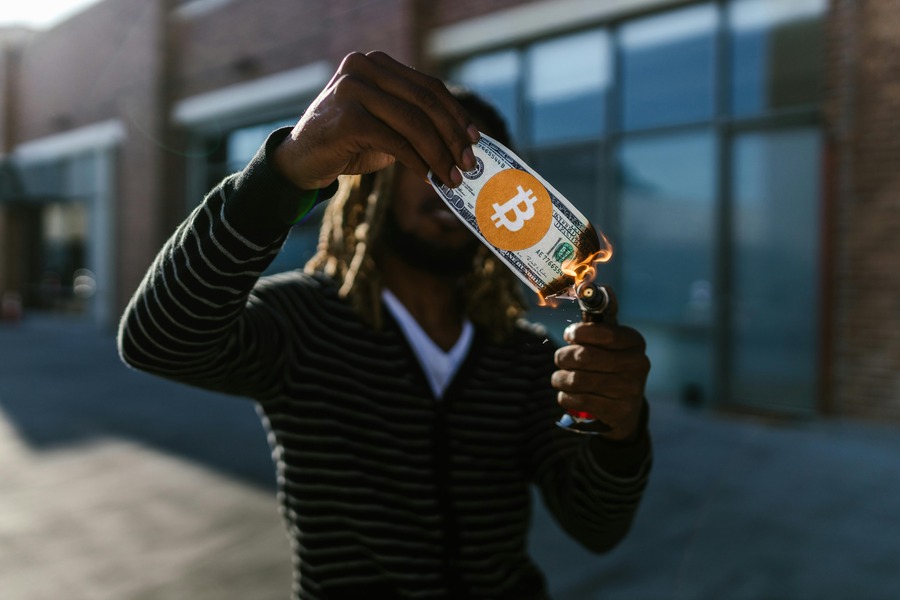What is Bitcoin? A Beginner’s Guide

Bitcoin Explained: From Digital Cash to Global Asset
Bitcoin, the original cryptocurrency, emerged in 2009 not just as a digital currency, but as a revolutionary concept: peer-to-peer electronic cash operating without intermediaries. Since its inception, Bitcoin (BTC) has evolved from an obscure technological experiment into a global financial phenomenon, often referred to as "digital gold," challenging traditional notions of money and value.
The Origins of Bitcoin: A Response to Crisis
Bitcoin was introduced to the world by an anonymous individual or group known as Satoshi Nakamoto. In October 2008, amidst the global financial crisis, Nakamoto published the influential whitepaper titled "Bitcoin: A Peer-to-Peer Electronic Cash System". This document outlined a vision for a decentralized digital currency, operating independently of traditional financial institutions and governmental control.
The network officially launched on January 3, 2009, when Nakamoto mined the first block, known as the "genesis block." Embedded within this block's code was a telling message, referencing a headline from The Times of London:
The Times 03/Jan/2009 Chancellor on brink of second bailout for banks.
This timestamped headline clearly positions Bitcoin as a direct response to the perceived failures and fragility of the traditional banking system exposed by the 2008 crisis. After guiding the project through its initial stages, Nakamoto vanished from public view around 2010, entrusting Bitcoin's future to a burgeoning open-source community.

How Does Bitcoin Work? The Technology Behind BTC
Bitcoin's groundbreaking functionality relies on several key technological components:
1. Blockchain Technology: The Immutable Public Ledger
The core of Bitcoin is its blockchain – a distributed, public ledger that records every single Bitcoin transaction. This ledger is composed of blocks, each containing a batch of recent transactions. These blocks are chronologically linked together using cryptography (specifically, hashing). Each new block contains the hash (a unique digital fingerprint) of the previous block, creating a secure, unchangeable chain. This inherent immutability and transparency mean anyone can verify transactions, but no one can easily alter the history.
2. Mining and Proof-of-Work (PoW): Securing the Network
Transactions are verified, and new Bitcoins are introduced into circulation through a process called mining. Miners use highly specialized and powerful computers (ASICs) to solve complex cryptographic puzzles. The first miner to find the solution gets to validate the next block of transactions and add it to the blockchain. This Proof-of-Work (PoW) system serves two purposes:
- It secures the network by making it computationally expensive and difficult for malicious actors to alter the blockchain.
- It incentivizes participation by rewarding successful miners with newly minted Bitcoin (the "block subsidy") and transaction fees paid by users. Learn more about the economics in our post: Is Bitcoin Mining Still Profitable?.
3. Decentralization: No Central Authority
Unlike fiat currencies issued and controlled by central banks, Bitcoin operates on a decentralized network. Thousands of nodes (computers running the Bitcoin software) worldwide maintain copies of the blockchain and enforce the protocol's rules. No single entity – government, corporation, or individual – controls the network, making it resistant to censorship and single points of failure.
4. Fixed Supply & Halving: Programmed Scarcity
Bitcoin's code enforces a strict maximum supply limit: only 21 million bitcoins will ever exist. Furthermore, the rate at which new bitcoins are created is halved approximately every four years through an event called the halving. The most recent halving occurred in April 2024, reducing the block subsidy to 3.125 BTC. This programmed scarcity makes Bitcoin a deflationary asset by design, contrasting sharply with inflationary fiat currencies.

Why is Bitcoin Important? Key Use Cases and Significance
Bitcoin's unique properties have led to its adoption for various purposes beyond simple payments:
1. Store of Value: "Digital Gold"
Often compared to physical gold, Bitcoin is valued for its scarcity (fixed supply), durability (digital existence), portability (easily transferable globally), divisibility, and verifiability. Many individuals and, increasingly, institutions view Bitcoin as a long-term store of value – a way to preserve wealth against inflation and economic uncertainty.
2. Financial Sovereignty: Control Over Your Assets
Bitcoin enables users to hold and control their wealth directly, without relying on traditional financial intermediaries like banks. By managing their own private keys (preferably using secure methods like cold storage), users achieve financial sovereignty, reducing counterparty risk associated with third-party custodians.
3. Borderless & Permissionless Transactions: Global Reach
Bitcoin operates on a global peer-to-peer network, accessible to anyone with an internet connection. It allows for sending and receiving value across borders, 24/7, often faster and cheaper than traditional systems, without requiring permission from any authority. This is particularly impactful for:
- Remittances: Significantly lowering fees for migrant workers sending funds home, especially to regions like Africa and Latin America where traditional fees are high.
- Financial Inclusion: Providing access to basic financial services (savings, payments) for the world's ~1.4 billion unbanked adults, many of whom reside in developing countries with limited banking infrastructure.
- International Aid & Donations: Enabling transparent and direct transfers to individuals or organizations in crisis zones or under financial restrictions.
- Global Commerce & Freelancing: Simplifying international trade and payments for businesses and remote workers by eliminating currency conversion complexities and delays (e.g., via platforms like Bitwage).
4. Inflation Hedge: An Alternative in Unstable Economies
In countries suffering from high inflation or hyperinflation, Bitcoin has gained traction as a tool to protect savings from rapid devaluation. Citizens in places like Argentina, Turkey, Nigeria, Lebanon, and historically Venezuela, have turned to Bitcoin to preserve purchasing power when their national fiat currency fails. Its mathematically enforced scarcity offers a stark contrast to centrally controlled currencies prone to debasement.
5. Censorship Resistance: Unstoppable Money
Because Bitcoin transactions are validated by a decentralized network and recorded on an immutable ledger, they cannot easily be blocked, reversed, or censored by governments or financial institutions. This makes Bitcoin a powerful tool for economic freedom:
- Supporting Dissidents: Activists and opposition groups in places like Hong Kong, Belarus, and Russia have used Bitcoin to receive funding when traditional financial channels were restricted or monitored.
- Bypassing Sanctions/Controls: It offers a way for individuals and organizations in sanctioned countries or those facing strict capital controls to transact internationally or move wealth.
- Protecting Assets: Refugees fleeing conflict or oppressive regimes (e.g., Syria, Ukraine) have utilized Bitcoin to carry their savings across borders without risking confiscation of physical cash.

How to Get Started with Bitcoin
If you're considering acquiring Bitcoin, approach it with caution and prioritize education and security:
- Educate Yourself (DYOR): Do Your Own Research! Before investing, understand what Bitcoin is (and isn't). Read the original whitepaper, explore resources like our Crypto for Beginners guide, and learn about the risks, especially volatility.
- Choose a Secure Wallet: You need a wallet to store your Bitcoin keys.
- Hot Wallets: Software/mobile wallets (e.g., Exodus, Trust Wallet) are convenient for small amounts or frequent use but carry higher online risks.
- Cold Wallets: Hardware devices (e.g., Ledger, Trezor) keep your keys offline, offering the best security for larger amounts or long-term holding. Refer to our guide on How to Safely Store Your Cryptocurrency.
- Buy Bitcoin via Reputable Exchanges: Use well-known and regulated cryptocurrency exchanges to purchase BTC with fiat currency. Examples include Coinbase, Binance, Kraken. Check our List with Exchanges. Start small and only invest what you can afford to lose.
- Prioritize Security: Use strong, unique passwords for exchanges. Enable Two-Factor Authentication (2FA) using an authenticator app or hardware key. Crucially, secure your wallet's private keys or seed phrase offline and never share them with anyone.

The Future of Bitcoin: Challenges and Opportunities
Bitcoin's journey continues, facing both challenges and significant growth vectors:
- Institutional Adoption: A major trend. Corporations like MicroStrategy (holding over 500,000 BTC) and Tesla (holding ~11,509 BTC) use Bitcoin as a treasury reserve asset. The launch of spot Bitcoin ETFs in the US in January 2024 by major players like BlackRock and Fidelity has significantly increased accessibility for traditional investors and institutions.
- Integration with Finance: Bitcoin is increasingly integrated into the financial system via ETFs, futures markets (CME), options, and crypto-backed loans. Payment processors like PayPal and Visa are also incorporating crypto functionalities.
- Technological Development:
- Scalability: The Lightning Network, a Layer 2 solution, continues to grow, enabling faster and cheaper transactions, making micropayments more viable.
- Efficiency & Privacy: The Taproot upgrade (activated in Nov 2021) improved network efficiency and transaction privacy (especially for multi-signature transactions) and enhanced smart contract capabilities.
- Sustainability: While PoW energy use remains a concern, there's a clear trend towards using renewable energy sources and integrating mining operations with energy grids for stabilization. Learn more: Can Crypto Go Green?.
- Regulation: The global regulatory landscape remains fragmented but is maturing. Frameworks like the EU's MiCA provide clarity in some regions, while the US continues to develop its approach. Clear regulation could foster further institutional adoption but also poses risks if overly restrictive.
- Competition: Bitcoin faces competition from thousands of altcoins, particularly smart contract platforms like Ethereum and Solana that offer different functionalities. However, Bitcoin maintains its unique position due to its unparalleled decentralization, network effect, security track record, and established narrative as "digital gold."
Conclusion: The Cornerstone of Crypto
Bitcoin represents a fundamental shift in digital finance. Its invention sparked a global movement towards decentralized, peer-to-peer value transfer and secure, digital scarcity. While it faces ongoing debates around scalability, energy use, and regulation, its resilience, growing adoption as a store of value, and proven ability to empower individuals in restrictive environments solidify its position as the foundational asset of the cryptocurrency ecosystem. Understanding Bitcoin is no longer just about understanding a niche technology; it's about understanding a potentially transformative force in the future of money and finance.







